…by Jonas E. Alexis
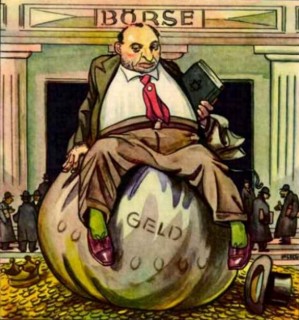 The issue of Jewish money scandals on a massive scale brings us to a point which can no longer be ignored: the relationship between capitalism and usury.
The issue of Jewish money scandals on a massive scale brings us to a point which can no longer be ignored: the relationship between capitalism and usury.
From early centuries, usury was viewed as a sinful enterprise by the Catholic Church because it led to the destruction of economic progress in any society.
Usury leads to compound interest, compound interest leads to economic collapse, and economic collapse leads to massive suffering (something proven by history and the recent economic collapse around us, most specifically in Greece).[1]
For example, the illustration is used that
“if Judas Iscariot had invested his thirty pieces of silver at just a few percentage points compound, repayable in silver as of today, the amount of silver required would be equivalent to the weight of the Earth.”[2]
There isn’t enough gold and silver in the universe to meet that challenge. In other words, the idea behind usury is an arithmetic impossibility.
The topic of usury is as old as civilization itself. Usury was routinely practiced in ancient civilizations such as Babylonia, and historian C.A. Herrick argued that “debt and excessive interest rate were burdensome” back then.[3]
In the process of time, “Overlords arose displaying great wealth that was produced by the sweat of others. Also, these overlords became masters of many slaves by means of foreclosure.”[4]
The topic of usury was also prevalent in Protestant writings.[5] Martin Luther wrote essays in 1519 and 1524, entitled “On Trading and Usury” and “The Treatise on Usury,” in which he argued that usury is a sophisticated vice, the consequences of which will ruin cities.[6] Luther wrote,
“In a short time, because of usury and avarice, he that could formerly live on a hundred guilders cannot do so now on two hundred.”[7]
 Yet Luther admitted that while usury is a form of sinful activity which has severe economic consequences, a four or five percent interest rate was reasonable under various circumstances.[8]
Yet Luther admitted that while usury is a form of sinful activity which has severe economic consequences, a four or five percent interest rate was reasonable under various circumstances.[8]
This “four to five percent interest” was later adopted by John Calvin, who repudiated the Catholic “blanket ban on usury, and by 1650, almost all Protestant denominations had come to agree with his position that a reasonable rate of interest was not sinful, provided the lenders act in good conscience, and do not exploit the poor.”[9]
Although Calvin repudiated consumption loans (excessive interest rates), he made commercial loans legitimate by saying that up to five percent interest rate is acceptable.[10] This stance went against the Aristotelian model. Calvin declared,
“I readily admit what even children can see that if you lock your money in a chest, it will not increase…[but] when you buy a field, is money not making money?”[11]
Here Calvin was implicitly conflating human labor and money and exchange, which has little to do with the interest rates that Aristotle was talking about.[12] According to Calvin, one Protestant scholar noted, “Interest is merely rent paid on capital.”[13]
Calvin, in order to challenge the church’s opposition to usury, gave this scenario in his Commentaries on the Four Last Books of Moses:
“But if a man is rich, and has money of his own, and has a very good estate and a large patrimony, and should borrow money of his neighbor, will that neighbor commit sin by receiving a profit from the loan of his money?
“Another borrower is the richer of the two, and might do without it and suffer no loss: but he wishes to buy a farm and enjoy the fruits: why should the creditor be deprived of his rights when his money brings a profit to a neighbor richer than himself?”[14]
But this particular scenario is implausible. St. Jerome, years before Calvin, put it this way:
“Did you give to a prosperous person or not? If he were prosperous, then you should not have given it; if he were not, then you should not ask it back as if he were.”[15]
Jerome seems to have been more in touch with the New Testament teachings than Calvin: “And lend, hoping for nothing again; and your reward shall be great” (Luke 6:35).
Calvin’s stand opened the door for usurious contracts, which had far reaching economic consequences in the next few centuries. Scholar Benjamin Nelson wrote some years ago in his study The Idea of Usury,
“Calvin on Deuteronomy became a Gospel of the modern era. Everyone from the sixteenth to the nineteenth century advocating a more liberal usury law turned to Calvin for support.
“Even those who would not or could not mention his name were compelled to speak his words. If today we do not appeal to his it is because we have learned his lessons too well. Religious and even ethical vocabulary is no longer needed to justify the moral and economic postulates which he helped to establish.”[16]
Protestant scholar Alister McGrath writes that “Calvin’s extension of the principle of usury broke new ground.”[17]
For example, Calvin wrote to a friend:
“Passages in both the Prophets and the Psalms display the Holy Spirit’s anger against usurers. There is a reference to a vile evil [Psalm 55:12] that has been translated by the word usura. But since the Hebrew word tok can generally mean ‘defraud,’ it can be translated otherwise than ‘usury.’
“Even where the prophet specifically mentions usury, it is hardly a wonder that he mentions it among other evil practices. The reason is that the more often usury is practiced with illicit license, the more often cruelty and other fraudulent activities arise…
“What am I to say, except that usury almost always travels with two inseparable companions: tyrannical cruelty and the art of deception. This is why the Holy Spirit elsewhere advises all holy men, who praise and fear God, to abstain from usury, so much so that it is rare to find a good man who also practices usury.”[18]
This was why the church condemned it—because those who practice usury always end up cheating system, most specifically the poor and needy. So when Calvin sophistically legitimized usury, he was indirectly (perhaps not intentionally[19]) making a case for “tyrannical cruelty and the art of deception.”

Calvin concludes, “The situation in which God brought the Jews together, combined with other circumstances, made commerce without usury apt among them. Our situation is quite different.
For that reason, I am unwilling to condemn it, so long as it is practiced with equity and charity.”[20]
Yet the next centuries showed opposite results. McGrath writes,
“Calvin’s views, which were seen by many as running counter to the clear meaning of the Bible, took some time to become accepted. By the middle of the seventeenth century…usury was finally regarded as acceptable.”[21]
The Protestant movement did not engender capitalism in the strict sense of the word, but it received a boost from the movement.[22] And capitalism and interest rates go hand and hand. McGrath writes that “the lending of money at interest was essential to the emergence of modern capitalism.”[23]
Sad to say, it was after the rise of the Protestant movement that the widespread condemnation of usury was no longer acceptable.[24] One Protestant scholar notes in particular that “it can be said that the Reformation was the pivot point for the key moral doctrine of usury.”[25]
Another declared, “It may surprise some to learn that Calvin was instrumental in liberalizing the Church’s stand on usury. This explains why it is that even the most strict and conservative [Protestant] Christian scholars in modern times still hold to what would by medieval standards be a liberal position on usury.”[26]
————————————————–

Although Luther condemned usury at first, later in life he embraced it. In a letter to Duke Frederick, Luther wrote,
“I would say that it is very necessary to have uniform regulations governing the charging of interest throughout the German lands. To forbid it altogether would not be right, for it may be justifiable under certain conditions.”[27]
This view came to have tremendous influence in Protestantism over the centuries. While some Puritans did not condemn it, others like William Penn did; he called it a separation from both religion and relation which God had created.
In 1611, Roger Fenton, one of the translators of the King James Bible, published A Treatise of Usurie [sic], in which he declared,
““They will not call it Usurie, lest the word should be offensive, or make the thing odious. But it shall be termed Use or Usance in exchange…or it shall be called Interest, or Consideration, which are civil and mannerly terms, though by them they mean nothing else but plain Usurie.”[28]
In the twenty-first century, Protestant scholars in general do not see a problem with usury, and some do not even discuss it in their works.[29] Only a few condemn the practice, such as C. S. Mooney, who pointed out that Protestant economist Gary North tried to defend usury.[30]
When the translators of the King James Bible translated the Greek word Tokos as “usury,” North faulted them and said that the word meant “interest.”[31] Why are some uneasy about the term? Because at the most basic level usury entails cheating in a sophisticated way.
Mooney should be praised for his careful analysis of the historical debate surrounding usury. He spends a great deal of time in his work refuting the fallacious arguments proposed by fellow Protestant writers, including Larry Burkett (who warns people about being a borrower, but has little to say about the lender who is suppressing the poor). As Mooney rightly puts it,
“What popular counsel amounts to is this: do not be enslaved by borrowing, but enslave others by lending.”[32]
Mooney’s work was published in 1988, but it seems that he was just a prophet for in Protestant circles. He writes, “It becomes obvious that much that is wrong about our economy today is directly the result of the sin of usury.”[33]
But people like Mooney who reject usury are in the minority. Noted Protestant scholar David W. Jones laments that
“while Christians in Western nations enjoy unparalleled wealth and Christians in other parts of the world are struggling for basic economic necessities, the topic of financial ethics has not received as much attention by evangelical Christian scholars as other comparatively relevant areas of doctrine, such as gender roles, homosexuality, or even war.”[34]
McGrath writes of Luther’s “On Trade and Usury” that “Luther’s economic thought—if one can dignify it with such a title—which was hostile to any form of capitalism largely reflects his unfamiliarity with the sophisticated world of finance then emerging in the great free cities.”[35]
Of Calvin, however, he writes that “he appears to have been fully cognizant of the basic principles of capital. The productive nature of both capital and human work is fully recognized.”[36]
————————————————–
 A working definition of usury is
A working definition of usury is
“the practice of charging financial interest in excess of the principle amount of a loan,” or “interest above the legal or socially acceptable rate.”[37]
The New Oxford Dictionary defines it as “the illegal action or practice of lending money at unreasonably high rates of interest.” As Mooney put it, usury revolves around “gain to the usurer for which he did not labor, and is that for which the borrower did labor, but does not enjoy the benefit.”[38]
In its etymological root, usury entails the practice of “violent seizure of property by pirates.”[39] Gregory Nazianzen of the fourth century put it this way:
“A man defiles the earth with usury and interest, gathering where he did not sow and reaping where he did not plant—reaping his gain not from the earth but from the need of the poor.”[40]
As we shall see in the next two articles, whenever this practice is followed in a society, sophisticated ways of cheating become the norm, and the rich and the powerful cheat the oppressed, the poor, and the needy.[41]
In the Roman Empire, after the death of Augustus, the rich started employing usury to increase their wealth.[42] In the process, they largely “controlled any financial movements in the economy.”[43]
Eventually, during the decline of the Roman Empire, “the tenant-farmers were reduced to serfdom by their creditors.”[44]
 By 325 A.D., usury was banned by the Council of Nicea as an immoral and sinful act.[45] Jerome (340-420) declared that all forms of usury were immoral and therefore forbidden, and that the usury teaching in Deuteronomy 23:19-20 that was allowed with respect to foreigners could no longer be applied in light of Christ’s teachings.
By 325 A.D., usury was banned by the Council of Nicea as an immoral and sinful act.[45] Jerome (340-420) declared that all forms of usury were immoral and therefore forbidden, and that the usury teaching in Deuteronomy 23:19-20 that was allowed with respect to foreigners could no longer be applied in light of Christ’s teachings.
Jerome’s argument was persuasive precisely because usury, at its eventual root, is counterproductive in the New Testament, where Christ teaches His followers to “lend freely, hoping nothing again; and your reward shall be great, and ye shall be the children of the Highest” (Luke 6:35).
In the 400s, Pope Leo the Great again declared that the prohibition against usury was to be upheld. By 800, usury was universally condemned, and for 300 years church and state were in one accord.[46]
By the twelfth and thirteenth centuries, the Catholic Church had fostered a long line of apologists who condemned the practice, although “the evil survived.”[47]
Usury was gradually adopted by some Catholics, which led some scholars to write that they only paid the prohibition lip service.[48] It could also be demonstrated that during the eleventh, twelfth, and thirteenth centuries, lending at interest was practiced by some bishops.[49] But the same scholars could never bring themselves to the fact that those bishops were contradicting the Church’s teachings on usury.
Usury was eventually condemned by all religious institutions, including Islam, Hinduism, and Buddhism,[50] because it was viewed as a practice that oppressed the poor and needy and had the potential to bring about the collapse of economic progress. In Islam, for example, trade or fee is permitted, but usury is not.
Philosophers such as Plato, Aristotle, Cicero, Seneca, and Plutarch also condemned usury as unnatural (contra natura) and immoral. This discussion became so important in Plato’s Law that he ultimately not only advises that “no money should be lent at interest” but that “the borrower should be under no obligation to repay either capital or interest.”[51]
Usury was indeed a huge problem in ancient Greece at the time—Plato says in The Republic that the oligarchs gather their wealth through usury and by ruining the life of others, namely the poor.[52] Aristotle called usury “the most hated” form of “getting wealth.”[53]
Marcus Porcius Cato, a Roman statesman who lived between 234 and 149 B.C., indirectly equates usury with murder.[54] The usurious activity of the ancient Greek oligarchs had an intermission when Solon came to power—he persuaded rich and poor to come to a mutual agreement—a time Durant calls “the Solonian Revolution.” Solon noticed,
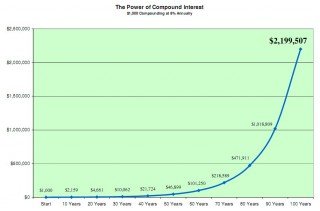 “Many undeserving men are rich, while their betters are poor. But we will not exchange what we are for what they have, since the one gift abides while the other passes from man to man.”[55]
“Many undeserving men are rich, while their betters are poor. But we will not exchange what we are for what they have, since the one gift abides while the other passes from man to man.”[55]
Solon, a successful and honest merchant, observed that “the wealthy reduced the masses to a desperate penury.”[56]
By 594 B.C., Solon was called to represent the poor and the middle class. As soon as he got to power, Aristotle stated that he removed “all existing debts, whether owing to private persons or to the state.” In the process,
“all persons enslaved or attached for debt were released; those sold into servitude abroad were reclaimed and freed; and such enslavement was forbidden in the future.”[57]
Though many assumed personal motives, the truth was that Solon lost much in the process.[58] The rich and powerful of course went mad, saying that Solon had confiscated Greece’s property, “but within a decade opinion became almost unanimous that the act had saved Attica from revolution.”[59]
In order to maintain a balanced economic life, Solon divided the people of Attica into four categories: the pentacosiomedimmi, the hippes, the zeugitai, and the thetes. The first category included “five-hundred-bushel men, whose annual income reached five hundred measures of produce, or the equivalent thereof.”
The second category consisted of men “whose income was between three and five hundred measures.” Men in the third category men were due “between three and five hundred measures.” The last category included “all other freemen.”[60] Durant writes:
“Honors and taxes were determined by the same rating, and the one could not be enjoyed without paying the other; furthermore, the first class was taxed on twelve times, the second class on ten times, the third class on only five times, the amount of its annual income; the property tax was in effect a gradual income tax. The fourth class was exempt from direct taxation.
“Only the first class was eligible to the archonship or to military commands; the second class was eligible to lower offices and to the cavalry; the third class was privileged to join the heavy-armed infantry; the fourth was expected to provide the common soldiers of the state.
“This peculiar classification weakened the kinship organization upon which the oligarchy had rested its power, and established the new principle of “timocracy”—government by honor or prestige as frankly determined by taxable wealth.
“A similar ‘plutocracy’ prevailed, throughout the sixth and part of the seventh century, in most of the Greek colonies.”[61]
Although Solon, as do many rulers, made some bad decisions (such as legalizing and taxing prostitution[62]), it was obvious that something had to be done with respect to usury.
————————————————–
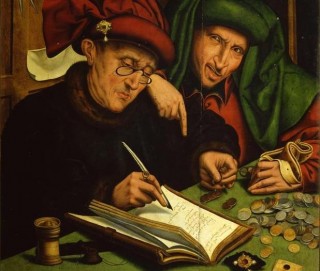 The view that usury was wrong was so widespread that in the fourteenth century Dante put usury and sodomy on equal footing in hell, making the point that both activities are contrary to nature.
The view that usury was wrong was so widespread that in the fourteenth century Dante put usury and sodomy on equal footing in hell, making the point that both activities are contrary to nature.
The condemnation of usury continued to find supporters all the way to the twentieth century among people like Silvio Gesell and Margrit Kennedy, who said that interest “acts like cancer in our social structure.”[63]
Other voices, such as C. H. Douglas, Irving Fisher, and Henry Calvert Simons, have all made it clear that usury is immoral.[64]
We are just repeating history, and all we have to do is observe how compound interest is taking a huge toll on almost all the strata of the U.S. economy, especially among college students and home owners.[65]
In early 2012, student loan debt reached $1 trillion,[66] with the average graduate owing at least $25,000.[67] During the same season, student debt rose by 8% and college tuition skyrocketed.[68]
Fifty-one-year-old Doug Wallace, who graduated from Eastern Kentucky University with a debt of $89,000, declared, “It’s like you’re not of much worth in society.”[69] Courts are now finding that “debt collectors misled borrowers” with regard to student loans.[70]
Kelsey Griffith, a student from Ohio, graduated with a debt of $120,000. Chelsea Grove, a Bowling Green State University drop-out, is now paying off a $70,000 debt, even though she has no intention of going back to school. Christina Hagan will have to pay off a $65,000 debt when she graduates from Malone University (an evangelical school). Although she makes $60,000 a year as a state representative,
“she plans to begin waiting tables in the next few weeks…to help pay down her student loans and credit cards.”[71]
Hagan has a message for the younger generation, “I need my generation to understand that nothing is free.”[72]
These, and many other, students got their education, but will be in debt for the rest of their lives. In addition, many college graduates find it very hard to get a full-time job in this economic crisis,[73] but the situation is worse for those who did not graduate at all.[74]
This is not helping education at all, where America is lagging behind other powerful nations.[75] The only ones benefitting from this situation are the usurers—and in the next two articles, we shall know who they are.
————————————————–

Thus, the introduction of capitalism provoked wide reactions from revolutionary movements such as Marxism and Socialism.
Karl Marx understood the labor theory of value, agreeing with Aristotle, Adam Smith, and David Ricardo that it is human labor that creates value. He wrote in The Poverty of Philosophy,
“Ricardo’s theory of values is the scientific interpretation of actual economic life…labor is the source of value. The measure of labor is time. The relative value of products is determined by the labor time required for their production.”[76]
Yet both Smith and Marx ended up on different paths. While Smith favored interest (precisely because he was a Protestant Whig), Marx provided a critique against it.
But Marx, by implicitly putting an extreme emphasis on the labor theory of value, ended up ignoring both creation and the God who created it.[77] Though Marx was partially right on the labor theory of value, he dishonestly used his sources to prove his preconceived point.
Like the typical biological determinist, Marx started with his conclusion and then proceeded to provide a hypothesis or “evidence” which confirmed his conclusion—an irrational and dishonest way of studying any subject.
And like the typical Darwinian evolutionist (Niles Eldredge comes to mind), who actually believed that lack of evidence proves that Darwinian evolution has happened (fancy term: punctuated equilibrium), Marx deliberately forged the evidence as he went on to develop his own theory.
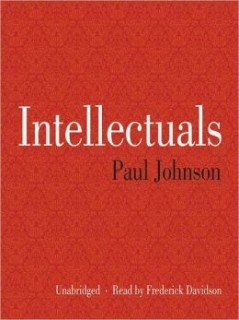 Marx would cite some specific statistics and authorities, but when the same sources are checked, they declared the opposite of what Marx wanted to prove! Philo-Semitic historian Paul Johnson himself writes,
Marx would cite some specific statistics and authorities, but when the same sources are checked, they declared the opposite of what Marx wanted to prove! Philo-Semitic historian Paul Johnson himself writes,
“Marx’s systematic misuse of sources attracted the attention of two Cambridge scholars in the 1880s. Using the revised French edition of Capital (1872-75), they produced a paper for the Cambridge Economic Club, ‘Comments on the use of the Blue Books by Karl Marx in Chapter XV of Le Capital’ (1885).
“They say they first checked Marx’s references ‘to derive fuller information on some points,’ but being struck by the ‘accumulating discrepancies’ they decided to examine ‘the scope and importance of the errors so plainly existing.’
“They discovered that the difference between the Blue Book texts and Marx’s quotations from them were not the result solely of inaccuracy but ‘showed signs of a distorting influence.’
“In one class of cases they found that quotations had often been ‘conveniently shortened by the omission of passages which would be likely to weigh against the conclusions which Marx was trying to establish.’
“Another category ‘consists in piecing together fictitious quotations out of isolated statements contained in different parts of a Report. These are then foisted upon the reader in inverted commas with all the authority of direct quotations from the Blue Books themselves…’
“[The scholars] concluded that their evidence might not be ‘sufficient to sustain a charge of deliberate falsification’ but certainly showed ‘an almost criminal recklessness in the use of authorities’ and warranted treating any ‘other parts of Marx’s work with suspicion.”[78]
————————————————–
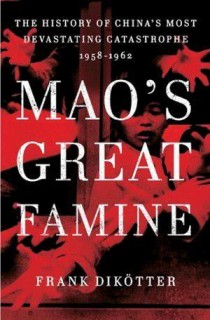 Since ideas have consequences, Marxism turned out to be another Jewish revolutionary movement which literally terrorized both the West and much of Asia in the twentieth century alone.
Since ideas have consequences, Marxism turned out to be another Jewish revolutionary movement which literally terrorized both the West and much of Asia in the twentieth century alone.
When Marxism was consistently applied in countries like the Soviet Union and China, it suppressed the very people it allegedly sought to help: the workers.
As we shall see later, Marx superficially declared that he wanted to help the workers, but ideologically his intention was to howl “gigantic curses” at all mankind.
Mao took the Marxist revolutionary idea to its logical conclusion and ended up starving and exterminating at least 40 million people in less than seven years.[79]
Benjamin Disraeli was right in 1844 when he wrote that any significant revolutionary movement has to have a cadre of Jewish intellectuals, writers, and politicians.[80]
Mao’s revolution would have been impossible without its Jewish figures. Laura Goldman of the Jewish Daily Forward admitted,
“85 to 90% of the foreigners helping the Chinese at the time of the Communist takeover were Jewish. This included the daughter of the founder of the brokerage firm Goldman Sachs, who left the comfort of her Park Avenue home to assist the Chinese.
“The Revolutionary” tells the story of Southern-born Sidney Rittenberg, the only American that has ever been admitted to the Chinese Communist Party.
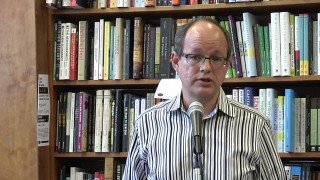
“The Mandarin-speaking Rittenberg, who was initially sent to China by the U.S. Army at the time of Japan’s surrender at the end of World War II, became an influential advisor to Mao Zedong and to the first premier of the People’s Republic of China, Zhou Enlai.
“His pivotal role at the Broadcast Authority, explaining the Communist Chinese point of view to America, earned him a higher salary than Chairman Mao.”[81]
Another Jewish American-born Chinese translator during that time was Sidney Shapiro, who declared in 1999 of the Communist Chinese,
“I love their spirit, I loved their ideology and what they were trying to do. And I wanted to help them build up the country.”[82]
We could include people such as Israel Epstein, who were some “of the few foreign-born Chinese citizens of non-Chinese origin to become a member of the Communist Party of China”?[83]
Shapiro, Epstein, and Chen Bidi were all members of the Chinese People’s Political Consultative Conference,[84] a largely Communist party which operates under a nice name.
But the interesting thing is that people like Rittenberg never got prosecuted even for allying with Mao. While Jewish organizations such as the ADL and the Simon Wiesenthal Center try to criminalize anyone they perceive to be a Nazi collaborator, Bidi and Epstein and others simply cannot be touched. Why?
Well, whenever you support Jewish revolutionary activity, you more than likely will be in good hands. It is like Mayor Bill de Blasio unapologetically saying that
“part of my job description is to be a defender of Israel….We take inspiration from Israel for how it has stared down terrorism and kept moving forward.”[85]
The Mayor did not stop there. He continued,
“There is a philosophical grounding to my belief in Israel and it is my belief, it is our obligation, to defend Israel. But it is also something that is elemental to being an American because there is no greater ally on earth, and that’s something we can say proudly.”[86]
 De Blasio knows that he is lying. If Israel has such a vibrant democracy, Judy Maltz of the Jewish Daily Forward argues the opposite.[87]
De Blasio knows that he is lying. If Israel has such a vibrant democracy, Judy Maltz of the Jewish Daily Forward argues the opposite.[87]
If De Blasio still wants to maintain his position, he needs to explain to us what Rabbi Eli Ben Dahan means when he says that, according to the Israeli newspaper Haaretz,
“Homosexual Jews have ‘higher souls’ than gentiles, gay or straight…”[88]
De Blasio also needs to exegete for us the halachic ruling which unequivocally and unambiguously declared that Gentiles do not have equal rights in Israel.[89]
More importantly, where is Israel’s freedom when the government has deliberately sterilized Ethiopian women?[90]
I really would love to hear what De Blasio’s wife thinks about this specific issue. She is either ignorant of this fact and is therefore a Zionist shill pimping the system, or she just chooses to live in contradiction, ignoring other decent human beings in order to protect the political power of Zionism.
I am more inclined to say that the latter seems to be the case, since De Blasio himself said that he has visited Israel three times, “most recently with his wife and son, and that he was especially moved by visiting Sderot, on the border with the Gaza Strip and often the target of rocket attacks.”[91] De Blasio concluded,
“City Hall will always be open to AIPAC.”[92]
So, AIPAC comes first, and the American people are just an afterthought.
[1] See E. Michael Jones, “Zombie Apocalypse and Wall Street,” Culture Wars, November 2011.
[2] See Wayne A. M. Visser and Alastair McIntosh, “A Short Review of the Historical Critique of Usury” http://www.alastairmcintosh.com/Articles/1998_usury.htm.
[3] S. C. Mooney, Usury: Destroyer of Nations (Warsaw, OH: Theopolis, 1988), 21.
[4] Ibid., 23.
[5] See David W. Jones, Reforming the Morality of Usury (Lanham, MD: University Press of America, 2004), 3-4.
[6] Martin Luther, “On Trading and Usury,” http://www.truecovenanter.com/truelutheran/luther_trade_and_usury.
phtml.
[7] Durant, The Reformation, 297.
[8] David Graeber, Debt: The First 5,000 Years (New York: Melville House, 2011), 322; also Sidney Homer, A History of Interest Rates (Hoboken, NJ: Wiley, 2005), 77.
[9] Ibid., 322.
[10] See Fernand Braudel, Civilization & Capitalism: The Wheels of Commerce (Berkeley: University of California Press, 1992), 2:568; Alessandro Roncaglia, The Wealth of Ideas (New York: Cambridge University Press, 2001), 37; Lionel Robbins, A History of Economic Thought (Princeton: Princeton University Press, 1998), 33-34, 66; Homer, History of Interest Rates, 77-78.
[11] John Calvin, “Letter on Usury,” Denis Janz, ed., A Reformation Reader (Minneapolis: Augsberg Press, 2008), 263.
[12] For a fuller analysis of Calvin’s errors on usury, see Mooney, Usury, 156-163.
[13] See Alister E. McGrath, A Life of John Calvin (Malden, MA: Blackwell, 1991), 231.
[14] Mooney, Usury, 160.
[15] Ibid.
[16] Ibid., 161.
[17] Alister McGrath, Christianity’s Dangerous Idea: The Protestant Revolution (New York: HarperOne, 2007), 333.
[18] Calvin, “Letter on Usury,” A Reformation Reader, 263.
[19] Calvin, “Letter on Usury,” A Reformation Reader, 264.
[20] Ibid., 263.
[21] Ibid., 334.
[22] See McGrath, A Life of John Calvin, chapter 11; also Rodney Stark, The Victory of Reason: How Christianity Led to Freedom, Capitalism, and Western Success (New York: Random House, 2005).
[23] McGrath, Christianity’s Dangerous Idea, 332.
[24] Homer, History of Interest Rates, 77-78; Joyce Appleby, Relentless Revolution: The History of Capitalism (New York: W. W. Norton, 2010), 98-99.
[25] Jones, Reforming the Morality of Usury, 4.
[26] Mooney, Usury, 154.
[27] Ibid., 50.
[28] Ibid., 7.
[29] See Mark A. Noll, God and Mammon: Protestants, Money, and the Market (New York: Oxford University Press, 2002).
[30] North later admitted Mooney was right (http://spiritwaterblood.com/2008/08/mooney-answers-north/).
[31] Mooney, Usury, 6.
[32] Ibid., 15.
[33] Ibid., 16.
[34] Jones, Reforming the Morality of Usury, 8.
[35] McGrath, A Life of John Calvin, 231.
[36] Ibid.
[37] Visser and McIntosh, “Historical Critique of Usury.”
[38] Mooney, Usury, 88.
[39] Ibid., 3.
[40] Frances Young, “Christian Attitudes to Finance in the First Four Centuries,” Epworth Review, September 1977: 79.
[41] Visser and McIntosh, “Historical Critique of Usury.”
[42] Constantina Katsari, The Roman Monetary System (New York: Cambridge University Press, 2011), 203.
[43] Young, “Christian Attitudes to Finance,” Epworth Review, 80.
[44] Ibid., 81.
[45] Homer, History of Interest Rates, 67-68; Mooney, Usury, 34-35.
[46] Homer, History of Interest Rates, 68.
[47] Braudel, Civilization & Capitalism, 2:560.
[48] See Stark, The Victory of Reason.
[49] Ibid., 60-61.
[50] Visser and McIntosh, “Historical Critique of Usury.”
[51] Plato, The Laws (Timeless Classics Books, 2010), 190.
[52] Plato, The Republic (New York: Dover, 2000), 215.
[53] Aristotle, The Politics (Chicago: University of Chicago Press, 2006), 23.
[54] Usury, Wikipedia.org.
[55] Will Durant, The Life of Greece (New York: Simon & Schuster, 1975), 113.
[56] Ibid.
[57] Ibid., 113-114.
[58] Ibid., 114.
[59] Ibid.
[60] Ibid., 115.
[61] Ibid.; emphasis added.
[62] Ibid., 116.
[63] Visser and McIntosh, “Historical Critique of Usury.”
[64] Ibid.
[65] See Andrew Martin and Andrew W. Lehren, “A Generation Hobbled by College Debt,” NY Times, May 12, 2012; Shaila Dewan, “Needy States Use Housing Aid Cash to Plug Budgets,” NY Times, May 15, 2012.
[66] Andrew Martin, “Slowly, as Student Debt Rises, Colleges Confront Costs,” NY Times, May 14, 2012; Gloria Goodale, “Student Loans: Is Petition to Forgive Debt Completely a Good Idea?,” Christian Science Monitor, April 20, 2012.
[67] Kimberly Hefling and Kristi Eaton, “Student Loans: What Will You Owe?,” Christian Science Monitor, April 16, 2012; Larry Gordon, “Graduating Collegians Cope with Student Debt in a Weak Economy,” LA Times, May 20, 2012.
[68] Josh Mitchell, “Student Debt Rises by 8% as College Tuitions Climb,” Wall Street Journal, May 31, 2012.
[69] Ron Lieber, “Last Plea on School Loan: Proving a Hopeless Future,” NY Times, August 31, 2012.
[70] Andrew Martin, “Debt Collector Misled Borrowers, Court Says,” NY Times, August 31, 2012.
[71] Martin and Lehren, “A Generation Hobbled,” NY Times, May 12, 2012.
[72] Ibid.
[73] Bonnie Kavoussi, “Half of Recent College Graduates Lack Full-Time Job,” Huffington Post, May 10, 2012.
[74] “Heavy Debt, but No Degree,” NY Times, May 29, 2012.
[75] Frank Bruni, “The Imperiled Promise of College,” NY Times, April 28, 2012.
[76] Jerry Z. Muller, The Mind and the Market: Capitalism and Western Thought (New York: Random House, 2003), 198.
[77] See Heinrich Pesch, Ethics and the National Economy (Norfolk, VA: IHS Press, 2004).
[78] Paul Johnson, Intellectuals (New York: Harper & Row, 1987), chapter 3.
[79] Frank Dikotter, Mao’s Great Famine: The History of China’s Most Devastating Catastrophe, 1958-1962 (New York: Walker & Company, 2010).
[80] Benjamin Disraeli, Coningsby (Boston: Adamant Media Corporation, 2005), 299.
[81] laura Goldman, “A Jew in Mao’s China,” Jewish Daily Forward, July 9, 2012.
[82] Quoted in Henry Chu, “Expatiates’ Long March Through China’s History,” LA Times, March 30, 1999.
[83] http://en.wikipedia.org/wiki/Israel_Epstein.
[84] http://english.peopledaily.com.cn/200503/09/eng20050309_176153.html.
[85] Quoted in Kate Taylor, “After Private Speech on Israel, de Blasio Is Pressed on Openness Pledge,” NY Times, January 24, 2014.
[86] Quoted in Joe Coscarelli, “De Blasio Gave a Private All-Israel Speech to AIPAC,” NY Magazine, January 24, 2014.
[87] Judy Maltz, “Jewish Enough for Birthright—But Not for Israel,” Jewish Daily Forward, January 23, 2014.
[88] “Gay Jews Have ‘Higher Souls’ Than Gentiles, Says Deputy Minister,” Haaretz, December 29, 2013.
[89] Hassan Kaabiya, “Equal Rights for Gentile Troops,” Y-Net News, April 30, 2013.
[90] Talila Nesher, “Israel Admits Ethiopian Women Were Given Birth Control Shots,” Haaretz, January 27, 2013; “Israel Accused of Deliberately Sterilizing Ethiopian Jewish Women,” African Sun Times, January 28, 2013.
[91] “NY Mayor at Closed AIPAC Gala: Part of My Job Is to Defend Israel,” Haaretz, January 24, 2014.
[92] Ibid.

Jonas E. Alexis has degrees in mathematics and philosophy. He studied education at the graduate level. His main interests include U.S. foreign policy, the history of the Israel/Palestine conflict, and the history of ideas. He is the author of the new book Zionism vs. the West: How Talmudic Ideology is Undermining Western Culture. He teaches mathematics in South Korea.
ATTENTION READERS
We See The World From All Sides and Want YOU To Be Fully InformedIn fact, intentional disinformation is a disgraceful scourge in media today. So to assuage any possible errant incorrect information posted herein, we strongly encourage you to seek corroboration from other non-VT sources before forming an educated opinion.
About VT - Policies & Disclosures - Comment Policy



